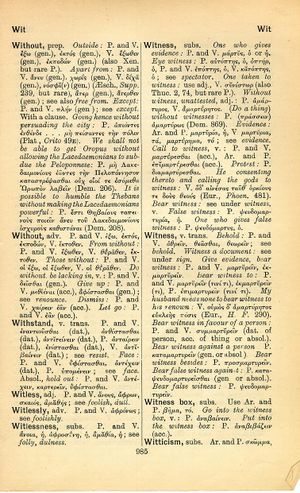without
Ἐπηγγείλατο εἰς ἐπανόρθωσιν τῆς πόλεως διὰ τὸ εἶναι ευσεβεστάτη καὶ κηδεμονικὴ. → She pledged herself to the reconstruction of the city because of her being most pious and dutiful.
English > Greek (Woodhouse)
prep.
Outside: P. and V. ἔξω (gen.), ἐκτός (gen.), V. ἔξωθεν (gen.). ἐκποδών (gen.) (also Xen. but rare P.).
Apart from: P. and V. ἄνευ (gen.), χωρίς (gen.), V. δίχα (gen.), νόσφι(ν) (gen.) (Aesch., Supp. 239, but rare), ἄτερ (gen.), ἄτερθεν (gen.); see also free from.
Except: P. and V. πλήν (gen.); see except.
With a clause. Going hence without persuading the city: P. ἀπιόντες ἐνθένδε... μὴ πείσανπες τὴν πόλιν (Plat., Crito 49E).
We shall not be able to get Oropus without allowing the Lacedaemonians to subdue the Peloponnese: P. μὴ Λακεδαιμονίους ἐῶντες τὴν Πελοπόννησον καταστρέψασθαι οὐχ οἷοί τε ἐσόμεθα Ὠρωπὸν λαβεῖν (Dem. 206).
It is possible to humble the Thebans without making the Lacedaemonians powerful: P. ἔστι Θηβαίους ταπεινοὺς ποιεῖν ἄνευ τοῦ Λακεδαιμονίους ἰσχυροὺς καθιστάναι (Dem. 208).
adv.
P. and V. ἔξω, ἐκτός, ἐκποδών, V. ἔκτοθεν.
From without: P. and V. ἔξωθεν, V. θύραθεν, ἔκτοθεν.
Those without: P. and V. οἱ ἔξω, οἱ ἔξωθεν, V. οἱ θύραθεν.
Do without be lacking in, v.: P. and V. δεῖσθαι (gen.).
Give up: P. and V. μεθιέναι (acc.), ἀφίστασθαι (gen.); see renounce.
Dismiss: P. and V. χαίρειν ἐᾶν (acc.).
Let go: P. and V. ἐᾶν (acc.).

